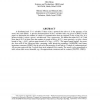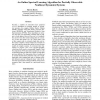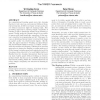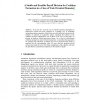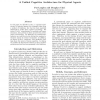1047 search results - page 15 / 210 » Learning the required number of agents for complex tasks |
WDAG
1990
Springer
13 years 11 months ago
1990
Springer
A distributed task T is 1-solvable if there exists a protocol that solves it in the presence of (at most) one crash failure. A precise characterization of the 1-solvable tasks was...
AAAI
2011
12 years 7 months ago
2011
Recently, a number of researchers have proposed spectral algorithms for learning models of dynamical systems—for example, Hidden Markov Models (HMMs), Partially Observable Marko...
KCAP
2009
ACM
14 years 2 months ago
2009
ACM
As computational learning agents move into domains that incur real costs (e.g., autonomous driving or financial investment), it will be necessary to learn good policies without n...
ATAL
2001
Springer
14 years 5 days ago
2001
Springer
In the last few years the use of coalition formation algorithms in multi-agent systems has been proposed as a possible way of modelling autonomous agent cooperation. Game theory pr...
AAAI
2006
13 years 9 months ago
2006
In this paper we describe Icarus, a cognitive architecture for physical agents that integrates ideas from a number of traditions, but that has been especially influenced by result...
